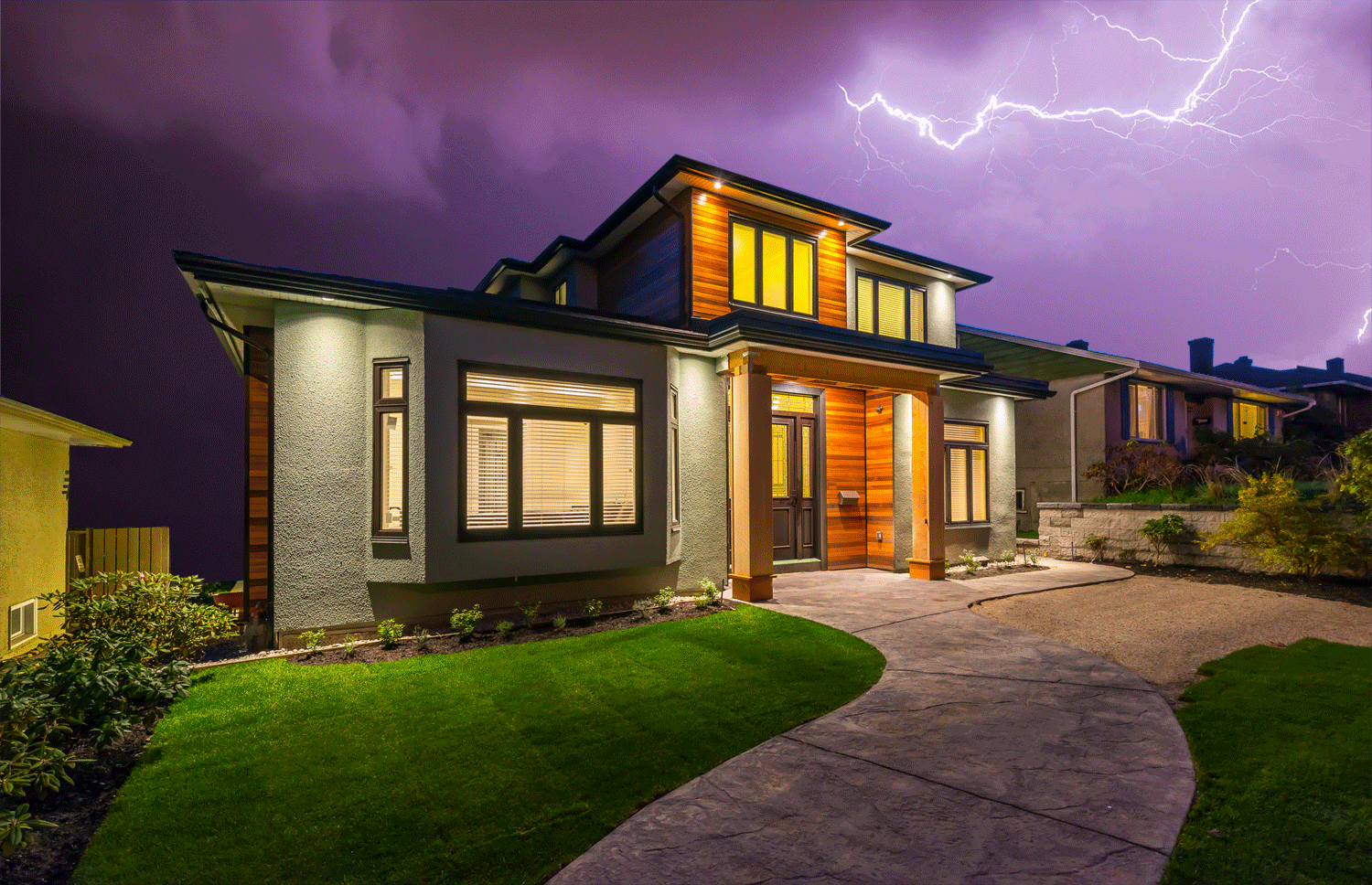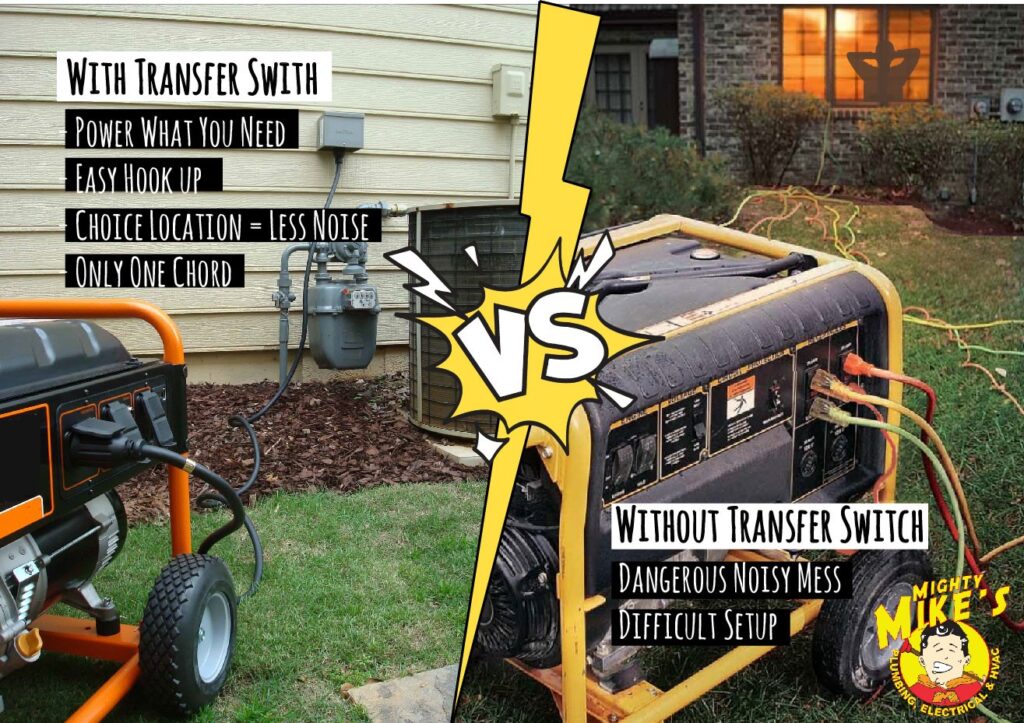
Automatic Power Backup
Keep the Power On
A permanently installed home backup generator protects your home automatically. They run on natural gas or liquid propane fuel, and sits outside just like a central air conditioning unit. A home backup generator delivers power directly to your home’s electrical system, backing up your entire home or just the most essential items.
-
- Automatic Operation
- Refueling Not Necessary
- Power Directly to Your Home
Did you know? The leading cause of lost power is strong storms, which are responsible for 47% of power outages. Equipment failure causes 34%, while 12% are due to snow and ice storms during the winter months. The remaining 7% is due to unknown causes.
How long will it take for my backup generator to start?
Backup generators are installed to provide seamless power in the event of an outage and will turn on automatically when your power goes out.
Can I run my generator as my main source of power?
No. Your generator should be used as a temporary power source during emergencies. It is best used to keep essential appliances running when your main source of power is unavailable.
Already have a portable generator?
Consider a transfer switch or interlock kit
- A transfer switch eliminates the risk of back-feeding the electrical utility which can cause injury to workers and property damage.
- You can run selected appliances such as a AC, water heater & well pump (which cannot be run with standard extension cords).
- The transfer switch allows you to manually transfer each of these loads separately whenever you need them.
- Only one connection to make—plugging one end of a cable into the portable generator and the other into a dedicated box connected to the transfer switch.
Did you know? From 2005 to 2017 more than 900 people died of carbon monoxide (CO) poisoning while using portable generators, according to data from the Consumer Product Safety Commission.
Safety Guidelines: Never operate a generator indoors. Position a portable generator at least 20 feet from your home with the exhaust directed away from your house, as well as any windows, doors, air-conditioners, and other structures. Never use extension cords that are cut or missing a ground.
1) Batteries: Make sure you have a good supply of batteries (and if they’re rechargeable batteries, ensure that they’re fully charged!) in a range of sizes for all your emergency needs. Have spares ready for flashlights and radios as well as for smoke detectors, clocks, and other necessities that can run on battery backup.
2) Flashlights: In preparation for a power outage, carefully test each of your flashlights and determine which works and which doesn’t, even with fresh batteries. Throw the flashlights that don’t work, and make sure the working ones have new batteries in them. Purchase additional flashlights if necessary, candles are not as safe.
3) Gas: Ensure you always have a full tank. Keep gas containers filled. These will come in handy not only for your vehicle, but also your generator.
4) Phone car charger and vehicle power inverter: Have your vehicle stocked with an extra phone charger and purchase a vehicle power inverter. These can be plugged into your car cigar plug and will supply you 120v.
5) Heating & cooking fuel: Keep sufficient propane, charcoal, wood available. These will come in handy not only for cooking outdoors but for heating.
6) Water: Have plenty of potable drinking water on hand. In case your pipes freeze, it may be a good idea to fill your bathtub with water.
7) Fridge & Freezer: Lower your fridge and freezer temperature. If power goes out, avoid opening the door unnecessarily. This will keep the food fresh longer.
8) Food: Stock up on nonperishable foods like nut butters, canned fruit and juices, granola bars, and crackers to keep yourself nourished, just in case you can’t cook or your fresh food has run out or spoiled.
9) Keep your pipes from freezing: Learn how to do this by clicking here.
10) Radio: When modern methods of emergency alerts such as TVs and phones are unavailable, an emergency radio with fresh batteries may be your lifeline to news and information about dangerous conditions and possible evacuation alerts.
11) Winterize your home: If you’ve been meaning to caulk your windows, do it before cold weather strikes. Check the weatherstripping around your doors; odds are it’s seen better days. Check the insulation in your attic and replace or supplement it if necessary. Also, consider purchasing some door draft stoppers, which you can tuck away in a closet until it’s time to deploy them. Mighty Mike can help with an infrared inspection (learn more).
12) Generators: if you live in an area that frequently loses power, you might consider purchasing a backup generator, which can be switched on manually or can automatically kick in when the power goes out, depending on which type you have. You’ll probably want one that’s powered by gasoline, natural gas, propane, or diesel, because solar-powered generators might not be the best choice in stormy conditions. These will help you have power to your well if your not connected to city water.


